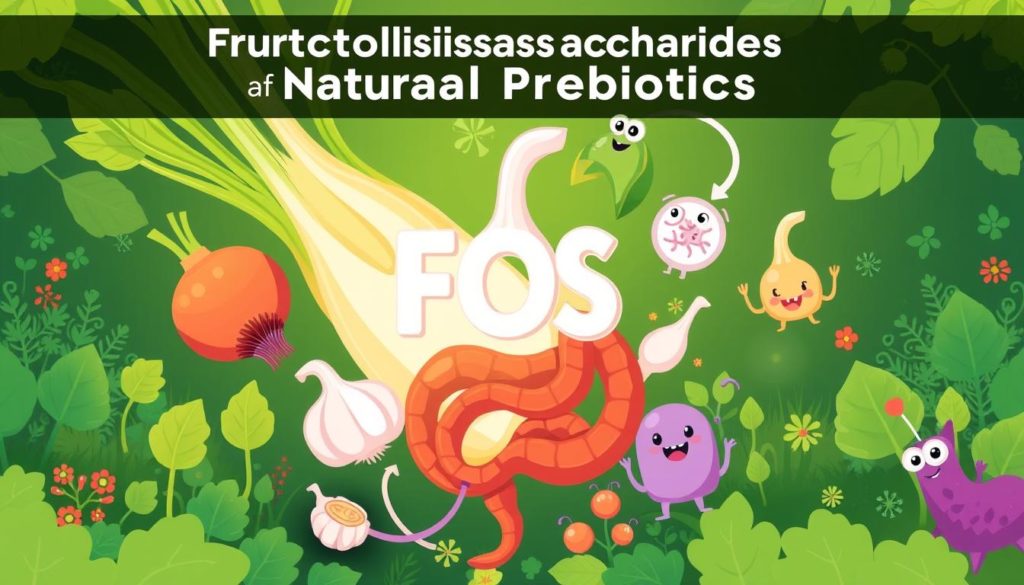Did you know less than 5% of Americans meet their daily prebiotic fiber needs? This fact highlights the need for natural prebiotics like fructooligosaccharides (FOS) in our diet. They improve gut health and our overall well-being.
Fructooligosaccharides (FOS) are gaining attention as key players in digestive health. Their unique structure and prebiotic nature are drawing interest. More people now look for natural ways to keep their gut healthy, putting FOS in the spotlight. But what are fructooligosaccharides, and why are they important?
This article will cover FOS’s many benefits, from supporting the immune system to being a versatile food ingredient. You’ll see how these prebiotics can change the game for gut health. Also, you’ll discover easy ways to add FOS to your meals.
Keep reading to learn about the prebiotic advantages of FOS. Find out why it could be the natural boost your gut has been waiting for.
What are Fructooligosaccharides (FOS)?
Fructooligosaccharides, known as FOS, are natural sugars in the oligosaccharides family. They consist of short fructose molecule chains. This unique makeup is great for our digestive health.

Definition and Composition
FOS are mainly made of fructose chains of different lengths. They’re called prebiotics because they boost good gut bacteria growth. Eating FOS-rich foods helps maintain a healthy gut microbiome by feeding these beneficial bacteria.
Sources of Fructooligosaccharides
Many natural foods are rich in fructooligosaccharides. These include:
- Fruits: Bananas, apples, and berries
- Vegetables: Onions, garlic, leeks, and asparagus
- Grains: Wheat and barley
Eating these foods often can boost your FOS intake, enhancing digestive health thanks to their prebiotic effects. Adding these FOS-rich foods to your meals is easy and beneficial for digestion.
The Role of Prebiotics in Digestive Health
Prebiotics are key to a healthy gut. They do more than fiber, which helps with bowel movements. Prebiotics feed the good bacteria in our stomachs, helping them grow.
Eating foods with prebiotics, like fructooligosaccharides (FOS), boosts these beneficial bacteria. This makes our digestive system work better. It keeps our gut healthy.

- Enhanced Digestive Wellness: Prebiotics like FOS balance our gut, easing bloating, constipation, and IBS symptoms.
- Improved Nutrient Absorption: A healthy gut means our body can better absorb important nutrients, improving our health.
- Strengthened Gut Barrier: Prebiotics feed the good bacteria, which keeps our gut wall strong. This protects us from bad germs and toxins.
Prebiotics support our digestive health in many ways. Adding them to your diet can boost your overall well-being. They’re essential for a balanced gut.
How Fructooligosaccharides (FOS) Support the Immune System
Fructooligosaccharides are key in boosting the immune system by working with gut bacteria. They help beneficial bacteria grow, making our immunity stronger.
Interaction with Gut Microbiota
Fructooligosaccharides feed the good bacteria in our gut, like Lactobacillus and Bifidobacterium. This balance is vital for our health. A healthy gut fights harmful bacteria, supporting our immune system.
Boosting Natural Immunity
FOS intake raises our natural immunity. It does this by increasing short-chain fatty acids in our gut. These acids fight inflammation and lower disease risk. With more beneficial bacteria, our body’s defenses get stronger, helping us stay healthy.
Functional Food Ingredients: Fructooligosaccharides in Your Diet
Fructooligosaccharides (FOS) are becoming a key functional food ingredient in various dietary products. They are found in foods like yogurts, cereals, and baked goods, boosting their health benefits. As people learn more, foods with FOS are getting more popular.
Adding FOS to your diet isn’t just good for your gut. These dietary prebiotics also help your body absorb calcium better, which keeps bones strong. Plus, FOS is a natural sweetener, cutting down the need for extra sugar and aiding metabolic health.
Nowadays, more consumers choose functional foods for their health perks. Foods enriched with prebiotics like FOS are in demand because they boost digestive health and nutrient uptake. This change shows a growing market for products that appeal to those mindful of their health.
| Food Type | Potential Benefits of FOS |
|---|---|
| Yogurts | Improves Gut Health |
| Cereals | Enhances Nutrient Absorption |
| Baked Goods | Natural Sweetening Agent |
The use of Fructooligosaccharides in daily foods reflects changes in our diet choices. As the perks of FOS become more known, the market grows with new products for health-aware people.
Benefits of FOS as a Natural Sweetener
Fructooligosaccharides (FOS) are getting a lot of attention as a natural sweetener. They come from natural sources and offer great health benefits. This makes them very popular.
Lower Calorie Content
One key thing about FOS is it has fewer calories. It means you eat less sugar when you choose FOS. This is good for anyone trying to watch their weight.
Adding FOS to your meals lets you enjoy sweetness without feeling bad about it. It’s a smart choice for keeping your diet healthy.
Effect on Blood Sugar Levels
FOS is also great for controlling blood sugar. It doesn’t spike your blood sugar like regular sugar does. This makes it perfect for people with diabetes or for those cutting down on sugar.
To wrap it up, choosing FOS means you get a sweetener that’s low in calories and kind to your blood sugar. It’s why health-minded folks prefer it.
Fructooligosaccharides vs Probiotics: Understanding the Difference
Prebiotics vs probiotics are vital for gut health. They have different roles but both are crucial.
Fructooligosaccharides (FOS) are a top prebiotic that feed the good bacteria in our gut. Unlike probiotics which are living microorganisms, prebiotics like FOS don’t live. Instead, they help good microbes grow by providing food.
Prebiotics: Feeding the Good Bacteria
Prebiotics are fibers that our bodies can’t digest. They help good bacteria grow. FOS is special because it boosts Bifidobacteria and helps with weight by making short-chain fatty acids (SCFAs).
By feeding the good bacteria, prebiotics maintain a healthy gut. This partnership keeps our bodies defended and strong.
Probiotics: Introducing Beneficial Bacteria
Probiotics introduce good bacteria to our system. They settle in the gut, aiding in balance. This is especially helpful after disruptions like antibiotic use or poor diet.
Probiotics and FOS together maintain a balance. While FOS feeds the good bacteria, probiotics make sure they are plenty. It’s a perfect match.
Understanding prebiotics vs probiotics shows us how to care for our gut health. They work together for a healthier digestive system. Adding both to our diet is key.
Scientific Research Supporting FOS Benefits
Many studies show how fructooligosaccharides help our health. These studies prove they’re good for our gut health and immune system. They’ve found that adding them to what we eat is a good idea.
A key study in the Journal of Nutrition looked at how FOS affects gut bacteria. The team used strict methods to see how gut bacteria changed in people who ate FOS. They saw a big boost in good bacteria like Bifidobacterium and Lactobacillus. These bacteria are key for a healthy digestive system.
Other research on FOS showed it makes our immune system stronger. A detailed study in the American Journal of Clinical Nutrition revealed that eating FOS regularly boosts our body’s defense against infections. This study, using controlled trials, confirmed FOS can lower the chance of getting sick.
Yet, we need more research. Some studies aren’t sure about the long-term benefits of FOS. A few have noted that high doses of FOS could cause stomach problems for some people.
Here’s a brief look at what some studies found:
| Study | Health Benefits | Methodologies | Conclusions |
|---|---|---|---|
| Journal of Nutrition | Improved Gut Health | Population Increase of Beneficial Bacteria | Enhanced Digestive Health |
| American Journal of Clinical Nutrition | Immune System Boost | Randomized Controlled Trials | Reduced Infection Incidence |
In summary, lots of research backs up the health perks of FOS. But, we must keep studying to fully understand them and clear up any doubts.
Incorporating FOS into Everyday Meals
Adding fructooligosaccharides (FOS) to your meals is great for your gut health. Here are simple tips and tasty recipes that are rich in FOS. These will help you include them in your daily meals easily.
Recipes and Suggestions
- Fruit Smoothies: Mix bananas, berries, and a spoonful of chicory root powder for a delicious, prebiotic-rich smoothie.
- Yogurt Parfaits: Create layers of yogurt with honey, nuts, and bananas for a treat.
- Healthy Salads: Combine sliced leeks and garlic with fresh greens. Add a dressing of olive oil and apple cider vinegar.
These recipes aren’t just healthy. They also boost your gut health. Try different combinations to find what tastes best for you. This will help you get your daily prebiotics.
Recommended Daily Intake
How much prebiotic to eat each day can vary. For the best effects, try to get about 3 to 8 grams daily. Here’s a guide to keep track of your intake:
| Food | FOS Content per Serving |
|---|---|
| Bananas | 0.5 grams |
| Chicory Root | 4 grams |
| Garlic | 1.5 grams |
| Leeks | 1 gram |
Eating these foods helps you get enough prebiotics easily. It’s important to eat them regularly. Doing so will improve your gut health over time.
Potential Side Effects and Precautions
Fructooligosaccharides (FOS) are good for your gut health and overall wellness. But, it’s important to know about possible side effects from FOS. Too much FOS can cause bloating, gas, and diarrhea for some. This happens more when your body isn’t used to a lot of prebiotics.
If you have gut problems like irritable bowel syndrome (IBS) or small intestinal bacterial overgrowth (SIBO), be careful. Adding FOS to what you eat should be a slow process. Start with small amounts and increase them gradually. This helps your gut adjust without causing a lot of discomfort.
Always talk to a healthcare provider before changing your diet a lot. This is key if you have health issues or are on medication. Your doctor can give you advice about FOS. They’ll make sure it’s good for you without causing harm.
FAQ
What are Fructooligosaccharides (FOS)?
Fructooligosaccharides (FOS) are a kind of prebiotic fiber found in plants. They belong to the oligosaccharides group. They help gut health by boosting the growth of good bacteria.
How do FOS benefit gut health?
FOS feed the good bacteria in our guts. This keeps our gut microbiome healthy. They make good bacteria multiply, which helps our digestion and gut health overall.
Can FOS support the immune system?
Yes, by promoting a healthy gut, FOS can strengthen our immune system. A robust gut microbiota boosts our natural defenses against bad germs.
What foods naturally contain Fructooligosaccharides?
You can find FOS in many fruits, vegetables, and grains. Bananas, onions, garlic, asparagus, and chicory root are common sources.
Are there any side effects of consuming FOS?
Mostly, FOS are safe, but too much can cause bloating or gas. Start slowly with them, and talk to a doctor if you have gut issues.
How do FOS compare to artificial sweeteners?
FOS are a natural, low-calorie sweetener option. They support gut health and don’t spike your blood sugar. This makes them good for watching your sugar intake.
What is the difference between prebiotics and probiotics?
Prebiotics, like FOS, are food for the good bacteria in our guts. Probiotics are good bacteria we eat in some foods or supplements. Together, they keep our guts healthy.
How can I incorporate FOS into my diet?
Eating foods rich in FOS, such as bananas, onions, and asparagus, is a good start. Adding FOS through supplements or foods with added FOS also works. Introduce them to your meals gradually.
Is there scientific evidence supporting the benefits of FOS?
Yes, many studies confirm FOS’s health benefits like better digestion and immune support. Ongoing research keeps showing how FOS improves our wellbeing.
What are some recommended FOS recipes?
Try adding chicory root to salads, bananas to cereal, or garlic and onions to stir-fries. These are simple ways to enjoy FOS’s prebiotic benefits.
What is the recommended daily intake of FOS?
Typically, 5-10 grams of FOS daily helps most people. Start on the low end to avoid digestive problems. Always check with a healthcare provider for advice specific to you.


